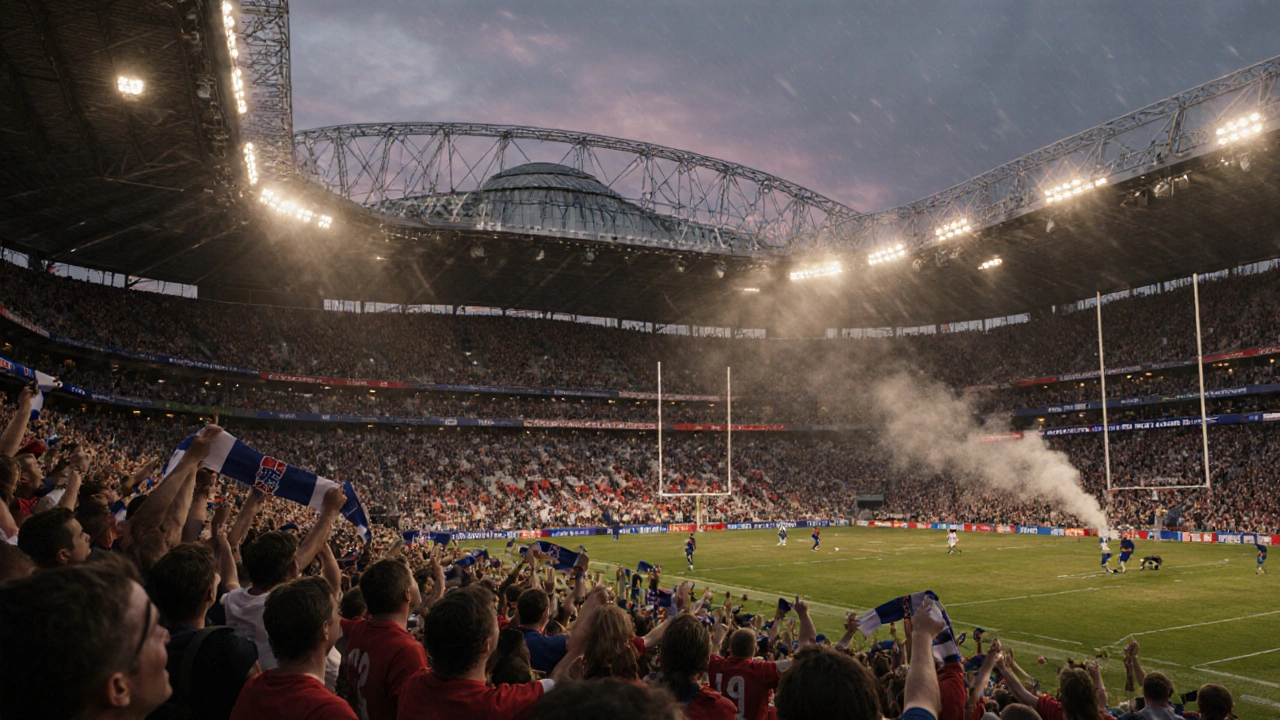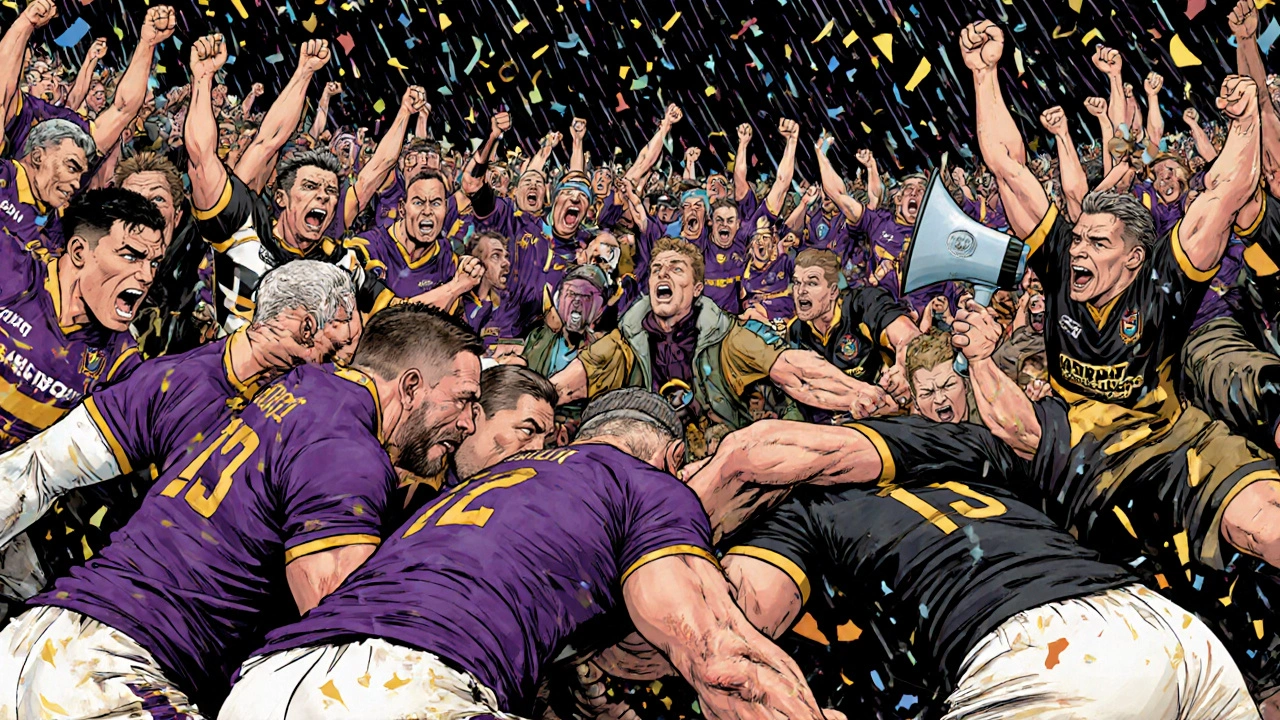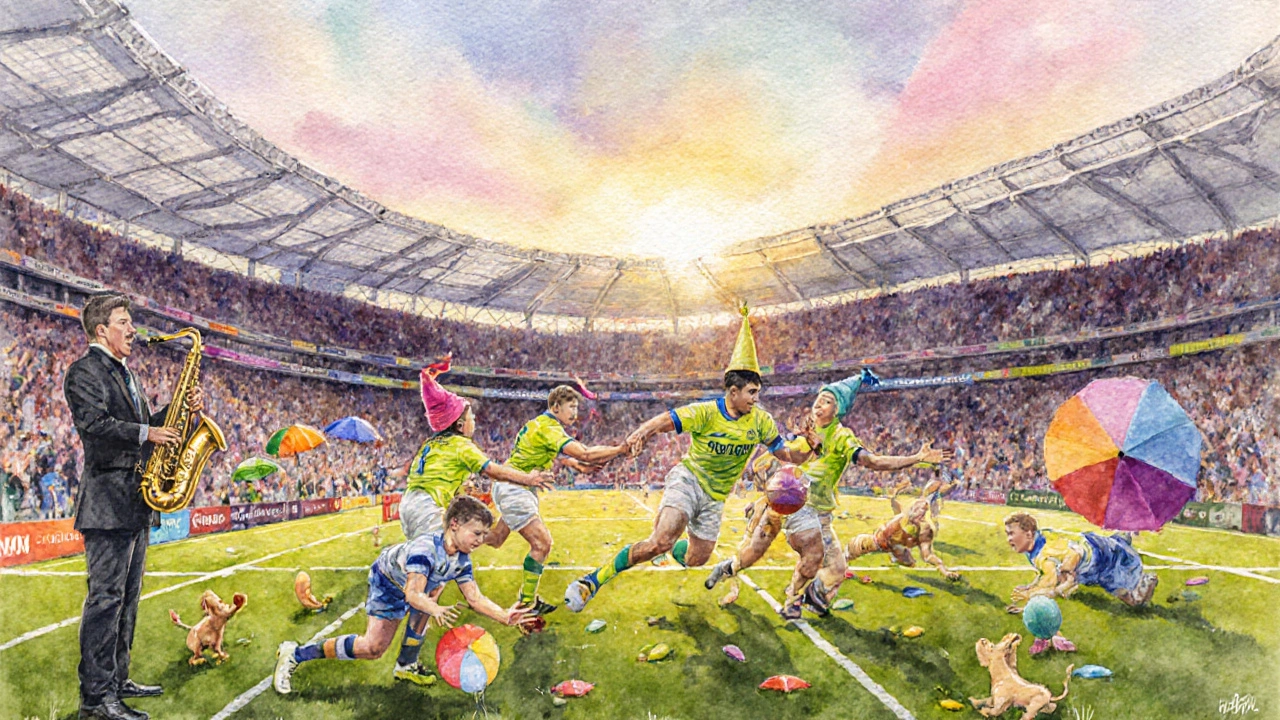
London isn’t just about the Tube, the Thames, and the queues at the Tower Bridge. Come match day, the city turns into a roaring sea of jerseys, chants, and the thud of bodies colliding on the pitch. Rugby isn’t a side note here-it’s a core part of the city’s sporting soul. Whether you’re a lifelong fan or someone who just saw a highlight and got curious, knowing where the big games happen and who plays them makes all the difference.
Where the Action Happens: London’s Major Rugby Stadiums
If you want to feel the energy of rugby in London, you need to be where the crowds are. There are three main stadiums that host top-tier rugby matches, each with its own vibe.
Twickenham Stadium is the cathedral of English rugby. Built in 1909, it holds over 82,000 fans and has hosted more international matches than any other ground in the world. It’s where England plays its home Tests, and when the national team takes the field, the whole area smells of roasted chestnuts and damp wool. The atmosphere isn’t just loud-it’s ritualistic. The crowd sings Jerusalem before kick-off, and the roar when England scores feels like it shakes the foundations.
Then there’s Stamford Bridge, home to Chelsea FC, but also the occasional rugby match. It’s not the usual spot, but when Saracens needed a bigger stage during their stadium renovations, they played here. It’s smaller than Twickenham, around 40,000 seats, but the intimacy makes the noise feel closer, louder.
The real hidden gem is The Stoop in Twickenham, home to Harlequins. It’s got just under 15,000 seats, but the atmosphere is electric. Fans are close to the action, the terraces slope steeply, and the crowd sings from the first minute. It’s the kind of place where you’ll hear a 70-year-old man shouting tactical advice to the fly-half-and he’s probably right.
The Clubs That Define London Rugby
London has six professional rugby clubs in the Premiership, and each has its own identity, history, and fanbase.
Harlequins are the flashy ones. They play attacking rugby, wear purple and gold, and their fans are known for being loud, creative, and a little bit eccentric. They’ve produced stars like Joe Marler and Maro Itoje. Their home ground, The Stoop, is where you go if you want to see rugby with personality.
Saracens are the powerhouse. They’ve won the Premiership five times since 2015 and the European Champions Cup three times. Their fans are disciplined, their training is brutal, and their defense is legendary. They used to play at Allianz Park in Barnet, but now split matches between Twickenham and Stamford Bridge. If you want to see how top-tier rugby is built-precision, structure, relentless pressure-this is your team.
London Irish had a rough few years. They were relegated in 2023 after financial trouble, but their legacy is still alive. They were the first professional club in London, founded in 1898, and their red-and-white stripes were a familiar sight at the Madejski Stadium. Fans still gather in pubs around Reading and West London, waiting for news of a return.
London Scottish plays in the Championship, the second tier. They’re not in the Premiership anymore, but they’ve got heart. Based at the Richmond Athletic Ground, they’re the club for loyalists who’ve been following rugby since the 1920s. Their matches are affordable, the beer’s cheap, and the banter is real.
Wasps used to be based in Coventry, but they had a short-lived London phase at the Coventry Building Society Arena. They’re now in financial limbo, but their history matters-they won four Premiership titles in the 2000s and had a fierce rivalry with Saracens. Don’t expect them back soon, but their legacy lingers.
London Broncos play rugby league, not union, but they’re worth mentioning. They’re the only professional rugby league team in the capital and play at the Trailfinders Sports Ground. If you’re curious about the differences between union and league, their games are a good place to start.

Big Match Days: When London Comes Alive
Not every weekend matters. But when it does, the city changes.
November is packed with international matches. England vs. New Zealand at Twickenham? That’s a national event. The All Blacks haven’t won there since 2012, but when they come, the whole city holds its breath. Tickets sell out in minutes. Pubs start serving special brews. The streets around Twickenham turn into a pre-game festival with live music, food trucks, and kids wearing full England kits.
December brings the Premiership final. It’s always at Twickenham. The winner gets the trophy, but the real prize is the bragging rights. In 2024, Saracens beat Harlequins 28-24 in a match that went down to the final minute. Fans were crying, hugging strangers, and singing until 3 a.m. That’s the kind of day that sticks with you.
Then there’s the London Double Header in September. Two Premiership matches back-to-back at Twickenham. One game is usually Harlequins vs. Saracens-their rivalry is the biggest in the city. The other is a regional clash, like Exeter vs. Gloucester. You get two games, two halves of adrenaline, and a full day of rugby culture. It’s not just a match-it’s a day out.
Don’t forget the Sevens tournaments in May. The HSBC SVNS Series stops at Twickenham, and it’s a completely different vibe. Faster, wilder, more colorful. Fans wear silly hats, the music’s louder, and the players are everywhere-high-fiving kids, signing autographs, dancing on the touchline after a try. It’s rugby, but with a party spirit.
What to Do Before, During, and After the Match
Getting to a match isn’t just about buying a ticket. It’s about the ritual.
Arrive early. Two hours before kickoff, the pubs around Twickenham fill up. The Red Lion and The Rugby Tavern are the classics. Order a pint of London Pride, grab a pie, and chat with strangers who’ll become your friends by the third quarter. The staff know the teams better than the TV pundits.
Public transport is your friend. The Tube to Twickenham is easy-take the District Line to Twickenham Station. It’s a five-minute walk. But if you’re going to The Stoop, take the District Line to Richmond, then walk 15 minutes. Buses are crowded, so plan ahead.
At the game, bring a raincoat. London weather doesn’t care about your tickets. Bring a scarf with your team’s colors. Don’t be shy about singing. Even if you don’t know the words, you’ll pick them up by the second half.
After the match, the pubs stay open. If your team won, celebrate like you’ve just climbed Everest. If they lost, don’t go home yet. Find a quiet pub, order a hot whiskey, and talk to someone who’s been to 200 matches. They’ll tell you stories about 1991, about the rain-soaked final against France, about the time a fan ran onto the pitch with a bagpipe. That’s the real rugby culture.

How to Get Tickets and Avoid Scams
Don’t buy from touts outside the stadium. They’re illegal, overpriced, and often sell fake tickets.
Go to the official club websites: harlequins.rfu.co.uk, saracens.com, londonirish.rfu.co.uk. Tickets go on sale three to six weeks before the match. Set a reminder. For big games like England vs. New Zealand, sign up for the RFU’s ticket alert system.
There are also official resale platforms like Ticketmaster’s Verified Resale. If you’re flexible, buy tickets for the lower tiers-they’re cheaper and you’re closer to the action.
Student discounts? Yes. Under-18s get half-price tickets at most matches. Seniors get discounts too. Always ask.
Why Rugby in London Matters More Than You Think
Rugby here isn’t just a sport. It’s community. It’s working-class roots in East London, tradition in Richmond, and global talent in the heart of the city. It’s the Irish immigrant who founded London Irish in 1898. It’s the Nigerian-born player who scored the winning try for Harlequins. It’s the retired teacher who’s been to every match since 1978.
Unlike football, rugby in London doesn’t feel corporate. The clubs still own their grounds. The fans still run the supporter clubs. The players still live nearby. You’ll see them at the local café after training.
If you want to understand London beyond the museums and the royal palaces, go to a rugby match. Watch the scrum. Hear the crowd. Feel the ground shake. That’s when you realize: this city doesn’t just host rugby. It breathes it.
Where is the best place to watch rugby in London?
For international matches, Twickenham Stadium is the top choice-it’s the home of England rugby and holds over 82,000 fans. For club rugby, Harlequins’ home at The Stoop offers the most intense atmosphere with passionate fans and close seating. Saracens play at Twickenham or Stamford Bridge for big games, and both venues deliver a high-energy experience.
Which London rugby club has the most fans?
Saracens have the largest following due to their recent success, winning five Premiership titles since 2015 and three European Cups. But Harlequins have the most loyal local fanbase, especially in South West London, where their identity and community ties run deep. Twickenham’s international matches draw the biggest crowds overall.
Can I get tickets on the day of the match?
Sometimes, but it’s risky. For big games like England vs. New Zealand or the Premiership final, tickets sell out weeks in advance. For smaller club matches, especially at The Stoop or Richmond, there might be a few tickets left on the day. Check the club’s website or app before you leave home.
Is rugby in London family-friendly?
Absolutely. Most matches have family zones with activities for kids, discounted tickets for under-18s, and food options that aren’t just pies and chips. Clubs like Harlequins and Saracens run youth programs and school visits, so bringing kids to a match is a great way to introduce them to the sport.
What’s the difference between rugby union and rugby league in London?
Rugby union is the dominant code in London, played by Harlequins, Saracens, and England. It has 15 players per side and more stoppages. Rugby league, played by the London Broncos, has 13 players, faster play, and fewer stoppages. Union is more common in London, but league offers a quicker, more continuous style of play.
When is the best time of year to catch a big rugby match in London?
November is peak season for international matches like England vs. New Zealand or South Africa. September has the London Double Header with two Premiership games at Twickenham. December brings the Premiership Final. For a lighter, festive vibe, try the HSBC SVNS Sevens tournament in May.